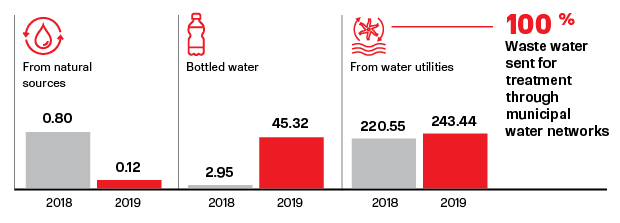MTS Eco-Office
MTS PJSC pays particular attention to corporate culture development by letting its employees act in an environmentally conscious way. The Eco-Office project has been run at MTS’s administrative facilities since 2012 with the aim of sustainable resource consumption by the Company employees and separate waste collection.
After the transition of the Company’s regional branches to electronic document management and outsourcing of printing, office paper consumption decreased by 19.5% with cartridge consumption dropping by 87.7%. High reliability of equipment reduced electronic equipment procurement by 30.5%.
MTS subsidiaries also implement their own environmental initiatives. For example, in 2019, MTS Bank arranged centralized collection of waste paper, including cardboard, in its headquarters and sent about 22 tonnes of waste for recycling.
Environmental responsibility initiatives were highly appreciated by the professional community. In 2019, MTS took 2nd place in the Green Leader Office category during the Green Office annual environmental awareness campaign of the Moscow Department for Environmental Management and Protection.
Separate municipal waste collection program
Specially labeled containers for waste paper were provided in all offices of the Company in 2019. In the reporting period, 93,318.1 kg of waste were sent for recycling. 10 tonnes were collected in Moscow and the Moscow Region only, up 4.5 times year-on-year.
The environmental initiative for collection of used electric batteries in Moscow and regional offices of MTS is very popular with its employees. In 2019, AlterEco, the official partner of the program, collected 1,492 kg of batteries for disposal. Another 435 kg of used batteries were collected by volunteer activities and sent for disposal to public collection centers in shopping malls.
Presses and containers for transparent plastic bottles were installed in six Moscow offices of MTS in 2019. The presses cut the number of vehicle trips required to deliver waste to recycling facilities thus reducing the carbon footprint. MTS also actively participates in the Good Caps initiative, with over 400 kg of plastic caps from bottles of juice, milk, kefir and other drinks collected in 2019, a more than fourfold increase year-on-year.
| Waste type | 2018 | 2019 | Management method |
|---|---|---|---|
| Hazard Class I (extremely hazardous) | |||
| Mercury waste (fluorescent lamps) | 15,509 | 12,611 | Disposal |
| Hazard Class III (moderately hazardous) | |||
| Used cartridges | 165 | 755 | Landfilling |
| Computer equipment | 570 | 1,315 | Disposal |
| Batteries, kg | 874 | 1,927 | Disposal |
| Hazard Class IV (low-hazard) | |||
| Mixed waste, tonnes | 4,574.57 | 3,475.68 | Landfilling |
| Non-ferrous metal scrap, tonnes | 156.21 | 35.04 | Recycling, disposal |
| Hazard class V (virtually non-hazardous) | |||
| Mixed waste, tonnes | 1,466.762 | 376.543 | Landfilling/disposal/recycling |
| Ferrous metal scrap, tonnes | 188.44 | 34.62 | Recycling, disposal |
| Waste paper, tonnes | 24.08 | 93.32 | Recycling |
Water consumption
Telecoms have no significant water-related impacts, but MTS promotes water stewardship. Water dispensers have been installed in the Company’s offices, and empty bottles are returned to the supplier for reuse. Waste water supplied by water utilities is sent for treatment through municipal water networks.
